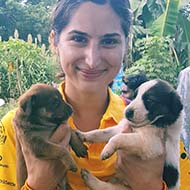
Mission Rabies issues important reminder on World Rabies Day.
UK-based charity Mission Rabies is calling on animal lovers travelling abroad to know how to protect themselves against rabies.
The warning comes on World Rabies Day (28 September), after the charity noted a spike in the transmission of the disease at a number of its project sites.
Mission Rabies founder and CEO Dr Luke Gamble said that while there is a low chance of being bitten by a dog with rabies, he is concerned that uninformed travellers may be putting themselves at risk.
“Great Britain is an island full of animal lovers, and when travelling abroad the temptation to pat, feed, or play with stray animals is there,” he said. “In rabies hotspots, one bite from an infected animal – or even a lick to broken skin – can lead to an unimaginable death."
One project site in which Mission Rabies saw a spike in rabies cases during the pandemic was India. The charity says that the closure of restaurants and other food outlets forced stray dogs to venture further in search of food - leading to fights with other dogs, conflicts with people, and consequently a rise in disease transmission.
“It has been tough, but we’ve adapted to the new reality on the ground,” said Luke. “As an essential service, we were issued with travel permits from the start, allowing us to respond to suspected rabies cases and keep vaccinating dogs in the areas of most concern.
“As the pandemic evolved, we did as well. We also provided the strays on the empty streets with food, water, and human interaction, to help them survive in their local area, and keep them from migrating.”
Although the threat level of rabies is extremely low, the disease still leads to an estimated 59,000 deaths each year. As such, Mission Rabies urges travellers to know that:
1. Rabies is serious. 99 per cent of all human rabies are caused by an infected dog bite.
2. How to be safe around stray dogs. Never disturb a dog that is eating, sleeping, or feeding its puppies.
3. The critical steps to take if bitten. Wash the wound with soap and running water for 15 minutes, apply liquid antiseptic, and then go to the hospital for the full course of anti-rabies injections.
4. Always consult your doctor or a travel doctor before heading overseas. Travelling abroad can impact public health. Discuss preventative measures with your doctor as many of the most widespread travel-related illnesses are vaccine-preventable.
Founded by the Worldwide Veterinary Service, Mission Rabies is supported by British volunteers from various veterinary and non-veterinary backgrounds. Working with specially-trained dog catchers, the team helps to vaccinate around 70 per cent of targeted canine populations to create herd immunity.
Image (C) MIssion Rabies.
For more information about the work of Mission Rabies and to get involved, visit finalrabiesgeneration.org.



 The RCVS has announced a new version of its 1CPD mobile app, with enhanced features for veterinary surgeons and veterinary nurses to record their continuing professional development.
The RCVS has announced a new version of its 1CPD mobile app, with enhanced features for veterinary surgeons and veterinary nurses to record their continuing professional development.